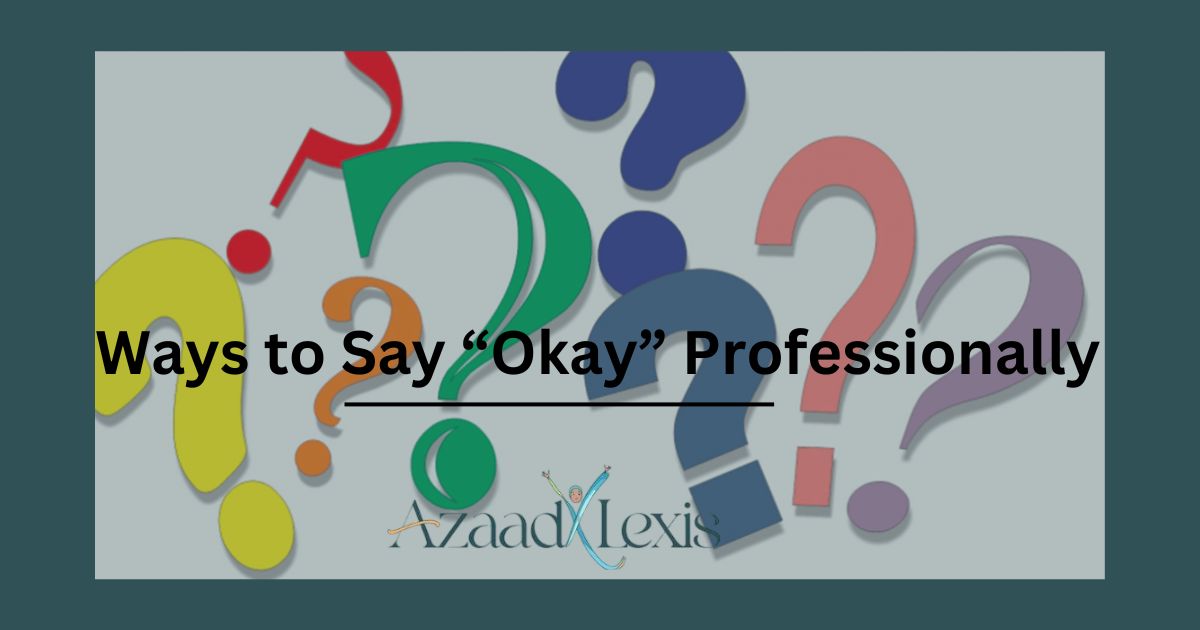In professional settings, the words we use matter a lot. Saying “okay” may seem simple, but in some cases, it can sound too casual or even dismissive. Using professional alternatives to “okay” can help you communicate better. It can also build trust and show your attention to detail.
Why Is It Important to Use Professional Alternatives to “Okay”?
Using professional language in your workplace creates a positive impression. “Okay” might feel fine for casual chats, but it often lacks clarity. A more specific response can make your communication stronger.
When you use polished language, it shows you are thoughtful and aware of your tone. For example, saying “Understood” or “Noted” gives confidence to the person you are speaking with. It reflects professionalism and avoids misunderstandings.
The Role of Tone in Professional Communication
Tone plays a big part in how your words are received. Saying “okay” with the wrong tone can sound indifferent. Using words like “Certainly” or “Absolutely” adds warmth to your reply. This makes your tone clear, polite, and engaging.
Understanding Context in Workplace Conversations
Context is another key factor. In meetings or emails, “okay” might sound too vague. For example, if your boss assigns you a task, saying “Got it” feels more confident. Understanding what the situation demands can help you choose the right words.
Top 20 Professional Alternatives to “Okay”
Choosing the right phrase depends on the situation. Here are some polished options you can use to replace “okay.”
Phrases for Agreement
When you need to show agreement, you can use phrases like:
- “Absolutely”
- “Certainly”
- “Of course”
These phrases show you are fully aligned with the other person. They sound more affirmative than “okay.”
Phrases to Acknowledge Instructions
If someone gives you a task, you can acknowledge it professionally. Some examples are:
- “Understood”
- “Noted”
- “Will do”
These replies confirm that you have understood the instructions clearly.
Polite Responses to Suggestions
When responding to suggestions, phrases like these can work well:
- “Sounds good”
- “I’m on it”
- “Fine by me”
These options feel polite and supportive. They make the other person feel heard and respected.
Is It Professional to Say “Okay”?
Saying “okay” is not always unprofessional, but it depends on the situation.
The Pros and Cons of Using “Okay” in Emails
“Okay” can be quick and easy in casual emails. But in professional communication, it can appear lazy. For example, “I’ll get to it” is more proactive. A better phrase reflects clarity and responsibility.
Cultural and Contextual Considerations
In some cultures, “okay” might be seen as too casual. Knowing your audience is important. A formal alternative like “Consider it done” can fit better in many workplaces.
Formal Ways to Ask “Are You Okay with That?”
Sometimes, asking for approval requires formal phrasing.
Phrasing for Emails
In emails, you can say:
- “Does this work for you?”
- “Would this be acceptable to you?”
These phrases sound polite and professional.
Phrasing for Meetings
During meetings, you can ask:
- “Is this agreeable to you?”
- “Are we aligned on this?”
These phrases encourage a collaborative tone.
Synonyms for “Okay” in Professional Communication
Synonyms can add variety and clarity to your responses.
Synonyms for Agreement
When agreeing, you can say:
- “Agreed”
- “That works for me”
- “Absolutely, I’ll get on that”
These terms are specific and reassuring.
Synonyms for Acknowledgment
To acknowledge a message or task, consider:
- “Got it”
- “It’ll be taken care of”
- “Consider it done”
These responses are action-oriented. They help avoid confusion about responsibilities.
Common Mistakes to Avoid When Saying “Okay” Professionally
Even small language choices can make a big difference.
Overusing Casual Language
Overusing casual terms like “okay” can make you seem unprofessional. Switching to “I’m on it” or “Happy to do so” conveys confidence.
Misinterpreting Tone in Written Communication
In emails, tone can be hard to read. A short “okay” might sound rude. Adding context, like “Certainly, I’ll follow up shortly”, creates a better impression.
Frequently Asked Questions
Why should I avoid saying “okay” in professional settings?
Saying “okay” can sound casual or vague. Using specific phrases like “Noted” or “Understood” ensures clarity and professionalism.
What are some professional alternatives to “okay”?
You can say “Certainly”, “Absolutely”, or “Got it” depending on the situation to convey confidence.
Is “okay” unprofessional in emails?
It depends on context, but “okay” can feel too informal. Using phrases like “Consider it done” makes emails sound more polished.
How can I ask, “Are you okay with that?” formally?
Try asking, “Does this work for you?” or “Would this be acceptable?” for a polite and professional tone.
What mistakes should I avoid when using “okay”?
Avoid overusing casual language or using “okay” without context, as it may appear indifferent or unclear.
Conclusion
Finding professional ways to say “okay” can improve your communication. It shows you are thoughtful, clear, and reliable. Whether in emails or meetings, using polished language builds trust. Consider the tone, context, and audience when choosing your words. With the right phrases, you can leave a lasting positive impact in any professional setting.


